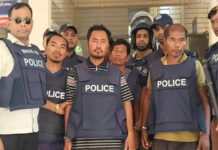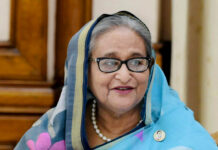
Rohingya refugees arrive at a beach after crossing from Myanmar, in Teknaf, Cox’s Bazar October 15, 2017. — Reuters photo
To strengthen the emergency WASH and child protection response for the new influx of Rohingyas in Cox’s Bazar, the government of Japan provided emergency grant aid of US$750,000 for six months through the United Nations Children’s Fund.
The emergency grant aid will complement the ongoing UNICEF response in these areas.
Since August 25, over 536,000 Rohingyas have arrived in Cox’s Bazar, up to 60 per cent of them are estimated to be children. Most are living in harsh and insanitary conditions in makeshift camps and new spontaneous settlements in the district of Cox’s Bazar.
‘Water, sanitation and hygiene condition are dire in the Rohingya camps and makeshift settlements and condition is getting desperate with the growing number of influx every day. This poses high risk of possible outbreak of diarrhea and other waterborne diseases specially among children,’ said Edouard Beigbeder, representative, UNICEF Bangladesh.
‘Moreover, children are traumatised due to the violence they faced in Myanmar and need immediate psychosocial and recreational support.’
The emergency grant aid will address the severe humanitarian condition of the Rohingyas by providing WASH facilities reaching out to 24,800 Rohingya children and their families directly and 60,000 indirectly, the UNICEF said on Sunday.
They will be provided with provision of safe drinking water, gender segregated and disability friendly latrines and bathing cubicles, handwashing facilities, hygiene promotion session and WASH emergency supplies.
The emergency aid will also provide child protection support reaching out to 5,000 children directly and 200,000 indirectly through provision of protective services, referral mechanism, case management and support to families of vulnerable children.
The emergency grant aid will be used to support the dire need of the Rohingya children and their families ensuring strong coordination amongst all humanitarian actors to ensure effective response.
Source: New Age










Is this a joke?